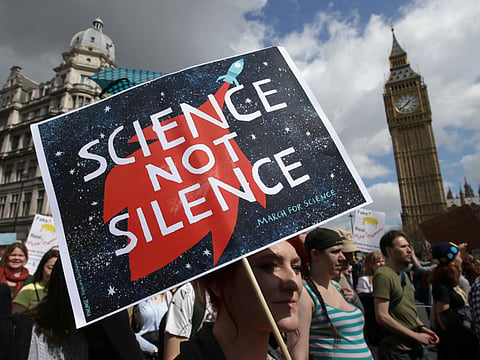Scientists march around the world to get heard
World media discuss the political subtext underlining the protests across the globe

The first March for Science organised across several US cities and around the world came under the radar of media organisations last week.
“When Ebola began to spread in West Africa in December 2013, it was invisible. A two-year-old who had been playing near a bat-filled tree in south-eastern Guinea died, apparently the first victim, but it took months for health workers to detect and report the spread of a disease with a high mortality... Scientists have now tracked the pathways of the virus in once-unimaginable detail, providing important lessons for preventing another outbreak. This is a terrific example of science at work for society, and it shows why this weekend’s March for Science was relevant,” said the Washington Post in an editorial supporting the initiative, titled ‘March for Science Could Save Lives’.
The paper then went ahead to underline the political subtext of the march. “Many of those organising and participating in the March for Science say it is a statement of belief in the power of empirical discovery, and not an anti-[Donald] Trump protest. It is fine to remain nonpartisan, but that should not mean being blissfully ignorant of the realities of politics... President Trump’s first budget, while declared dead on arrival in Congress, nonetheless starkly reflected his priorities. Along with cuts to environmental and climate science, he proposed to slash 18.3 per cent, or about $5.8 billion [Dh21.3 billion], from the National Institutes of Health budget for fiscal 2018. That would send a wave of disruption through biomedical research efforts across the country and around the world,” the paper said.
The Cleveland, meanwhile, examined the circumstances that led to a clarion call for such a march. “Science is a fact of life. You use it when you turn on the water, start your car or check your emails on your smartphone, but that doesn’t mean that science gets much respect... Should scientists don their lab coats [and bring some scientific games and exhibits] and take to the streets? That lack of respect seems to come directly from the top. President Donald Trump has questioned climate change, and turned his back on protecting the environment and on alternative fuels. And he doesn’t yet have a science adviser to counsel him on science and technology. It’s a role every president has filled since President Dwight D. Eisenhower officially appointed M.I.T. President James R. Killian as his first Special Assistant for Science and Technology in 1957. President Richard Nixon is the only president who left the position vacant, and then only after his two science advisers resigned, one by one,” the news outlet said.
The prestigious scientific journal Nature, in an editorial endorsing the march, said: “Yes, it is true that the march blurs the lines between science and politics. But that line is already much fuzzier than some try to argue. It is possible to care about science and scientific thinking while ignoring the political context in which it operates. But it is difficult to do that and demand change at the same time. These worldwide protests give scientists an opportunity to think hard about what they value about science, to recognise the commonalities in the goals they share with others and to reaffirm the scientific process as the best way of informing policy — even if it won’t always get the final say. Whatever misgivings some may have, these should surely be eclipsed by the opportunity to identify and harness the collective energy that this organised event offers researchers everywhere.”
The New York Times, however, struck a dissenting note and called the initiative “a terrible idea”.
“Among scientists, understandably, there is growing fear that fact-based decision making is losing its seat at the policy-making table. There’s also overwhelming frustration with the politicisation of science by climate change sceptics and others who see it as threatening to their interests or beliefs. But trying to recreate the pointedly political Women’s March will serve only to reinforce the narrative from sceptical conservatives that scientists are an interest group and politicise their data, research and findings for their own ends. A march by scientists, while well intentioned, will serve only to trivialise and politicise the science we care so much about, turn scientists into another group caught up in the culture wars and further drive the wedge between scientists and a certain segment of the American electorate.” Rather than marching in various cities around the world, the paper advised science activists to “contact with that part of America and the world that doesn’t know any scientists,” and said: “Help them understand what we do, and how we do it. Give them your email, or better yet, your phone number.”


